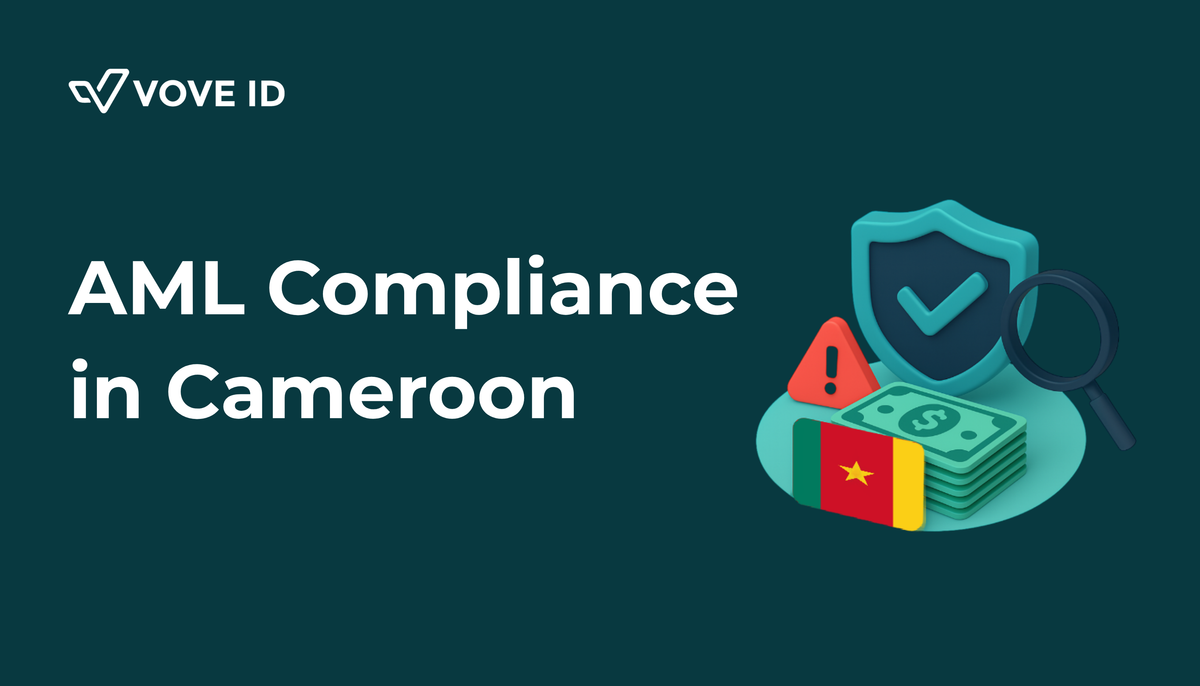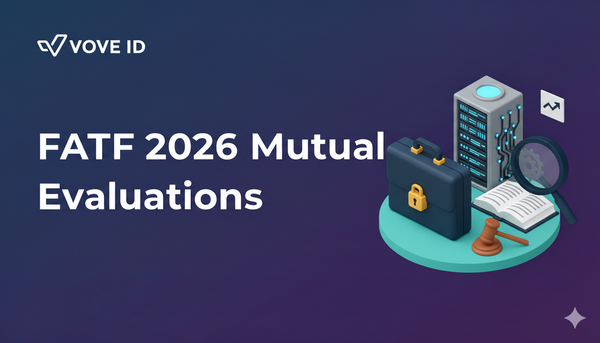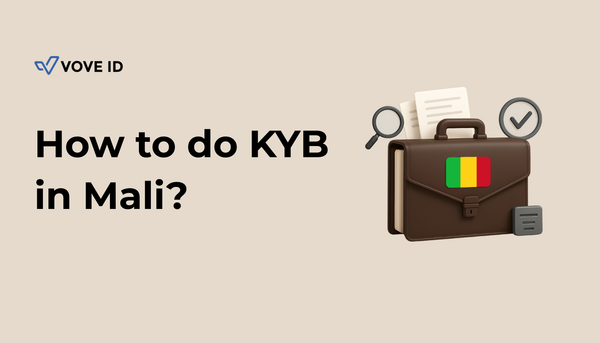AML Compliance in Cameroon: A 2025 Guide for Fintechs and Regulated Businesses
Explore Cameroon’s 2025 AML framework, FATF evaluation, and how VOVE ID supports fintechs with digital onboarding, AML screening, and automated compliance in the CEMAC region.

Cameroon stands at a pivotal moment in its financial evolution. As the economic engine of the CEMAC region, the country faces a dual challenge: accelerating fintech growth and persistent AML vulnerabilities.
According to BEAC, mobile money usage continues to rise sharply, bringing millions into the formal economy while exposing new channels for illicit flows.
The 2023 GABAC mutual evaluation highlighted both progress and gaps—stronger inter-agency cooperation through ANIF, yet continuing weaknesses in DNFBP supervision and beneficial ownership transparency. Cameroon remains under enhanced follow-up, with regulators striving to meet FATF standards by 2026.
For fintech founders launching payment apps in Douala or banks facilitating cross-border trade from Yaoundé, AML compliance has become a baseline requirement. A single STR failure can trigger COBAC sanctions, license suspension, or lasting reputational harm.
VOVE ID helps transform this regulatory pressure into an operational advantage. Our API-first platform automates KYC, KYB, and AML screening, significantly reducing onboarding friction while ensuring ANIF compliance. In Cameroon’s high-risk, cash-intensive market, automation is no longer a luxury—it’s a competitive necessity.
Cameroon’s AML Regulatory Framework: Regional Power, National Execution
Cameroon’s AML system reflects its CEMAC membership—a balance between regional oversight and national enforcement.
Regional Backbone
The CEMAC Regulation No. 01/CEMAC/UMAC/CM (2016) provides minimum AML/CFT standards for all six member states, including:
- Risk-based CDD
- Suspicious Transaction Reporting (STR) within strict deadlines
- Record retention for at least 10 years
- Mandatory screening of PEPs and sanctioned entities
COBAC, the regional banking commission, enforces compliance and has authority to issue sanctions or revoke licenses. In recent years, COBAC has emphasized technology-driven supervision, encouraging financial institutions to adopt API-based monitoring tools and digital reporting.
National Implementation
Cameroon’s Law No. 2016/014 criminalizes money laundering and terrorism financing.
The National Financial Investigation Agency (ANIF), established under Decree 2019/695, serves as the country’s Financial Intelligence Unit (FIU) and coordinates national AML efforts.
ANIF has improved the quality and quantity of STRs in recent years, though resource constraints continue to slow investigations—a challenge shared across the region.
2025 Regulatory Developments
- VASP Regulation: Licensing framework for cryptocurrency and virtual asset providers under review
- Beneficial Ownership Registry: Expected under the GABAC Action Plan
- Digital ID Integration: DGSN biometric cards now accepted for eKYC verification
- Cross-Border Cooperation: Cameroon’s participation in the Egmont Group strengthens data exchange and intelligence sharing
Core AML Obligations: The Compliance Stack
Cameroon’s AML obligations apply broadly to banks, fintechs, microfinance institutions, forex bureaus, and DNFBPs (lawyers, accountants, real-estate agents, casinos, and dealers in precious metals).
| Obligation | Description | Primary Regulator |
|---|---|---|
| Customer Due Diligence (CDD) | Verify customer identity and beneficial ownership; apply enhanced measures for PEPs and high-risk customers | ANIF, COBAC |
| Suspicious Transaction Reporting (STR) | Promptly report unusual or suspicious transactions | ANIF |
| Risk-Based Approach (RBA) | Design internal controls aligned with customer and product risk | COBAC |
| Record Keeping | Retain CDD and transaction records for at least 10 years | ANIF, COBAC |
| Training and Monitoring | Regular AML staff training and internal audit programs | ANIF |
COBAC’s recent inspections emphasize substantive compliance—not just policies on paper.
Institutions are expected to demonstrate active transaction monitoring, especially across mobile money and cross-border corridors.
GABAC 2023 Evaluation: Progress and Pain Points
The 2023 GABAC mutual evaluation assessed Cameroon as “partially compliant” on several FATF recommendations.
✅ Progress Areas
- Effective ANIF coordination, with more STRs leading to investigations
- Comprehensive legal framework covering predicate offenses
- Regional cooperation through Egmont and CEMAC mechanisms
❌ Ongoing Challenges
- Limited DNFBP supervision and awareness
- Lack of a centralized beneficial ownership registry
- Sanctions implementation remains incomplete
- Virtual asset regulation still in draft phase
The 2025 Action Plan includes technical assistance from the World Bank and IMF, aiming to improve transparency and risk-based supervision.
Cameroon-Specific AML Challenges
1. Cash-Dominant Economy
With much of the economy still cash-based, tracking financial flows remains difficult.
Mobile money has expanded financial access but also introduced vulnerabilities, including transaction structuring and agent-level fraud.
2. Cross-Border Informality
Cameroon’s trade corridors with Nigeria, Chad, and Gabon see substantial informal flows.
Weak oversight of remittances and trade-based money laundering complicates regulatory control.
3. Political and PEP Exposure
Significant public-sector spending and state-owned enterprises heighten exposure to politically exposed persons (PEPs), requiring enhanced due diligence and continuous monitoring.
How VOVE ID Supports AML Compliance in Cameroon
VOVE ID enables fintechs and financial institutions to build compliance programs that meet ANIF and COBAC expectations.
🛡️ Cameroon-Optimized Features
- DGSN Biometric Verification for fast, secure eKYC onboarding
- Automated AML Screening against global and regional watchlists
- Audit-Ready Recordkeeping ensuring full traceability and compliance confidence
- Configurable STR Templates aligned with ANIF reporting standards
💡 Results That Matter
VOVE ID clients across CEMAC report:
- Faster onboarding times
- Reduced false positives
- Lower compliance costs
- Improved detection of suspicious activity
By combining local regulatory understanding with global AML technology, VOVE ID helps Cameroonian institutions stay compliant, scalable, and audit-ready.
Cameroon’s biometric ID system, managed by the General Delegation for National Security (DGSN), is one of the most advanced in Central Africa.
It underpins the country’s transition toward electronic KYC (eKYC), enabling fintechs to verify customers digitally and meet AML requirements with higher accuracy.
Compliance as a Growth Engine
Cameroon’s AML reforms reflect Africa’s broader journey—rapid innovation pushing regulators to modernize.
For fintechs and financial institutions, compliance is no longer a box-ticking exercise; it’s a core business enabler.
Three takeaways for 2025:
- Manual AML processes can’t keep pace with digital finance.
- Automated, risk-based compliance builds customer trust and market credibility.
- Partnerships with local RegTech providers like VOVE ID offer the agility and compliance depth needed to scale.
🚀 Build Your AML Strategy for Cameroon
👉 Book your demo and join leading CEMAC fintechs using VOVE ID to scale securely.




